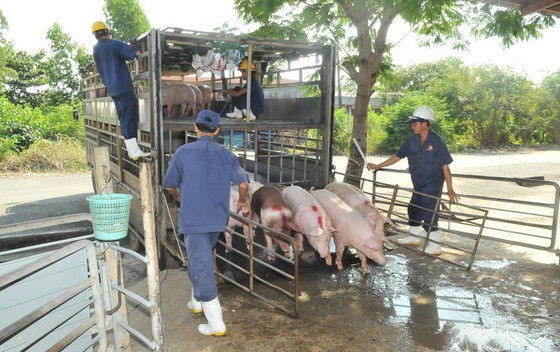
Although total pig herd of farming households in Dong Nai Province has shrunk by 70 percent, Mr. Tran Quoc Khanh, a farmer in Thong Nhat District, has not had any intention to increase pig herd as he thought that increasing pig herd at this time is quite risky.
With current complicated developments of the African swine fever, the fact that pork prices are on increase and about to escalate strongly at the end of the year is predictable but Mr. Khanh and thousands pig farming households in Dong Nai Province have not had plans to increase their pig herd yet as it is lucky for them to keep their pig herd untouched by the epidemic.
According to the Department of Agriculture and Rural Development of Dong Nai Province, within three months, the African swine fever hit 3,094 pig-farming households in 122 communes of 11 districts and cities, destroying 301,000 pigs (around 6,000 tons) with a loss of around VND405 billion. The remaining total pig herd of Dong Nai Province was more than 1.8 million pigs, a decrease of 600,000 pigs compared to that before the epidemic, or 30 percent of total pig herd of the province.
Meanwhile, activities to disinfect and localize African swine fever outbreak have been facing several difficulties, especially in rainy season. Therefore, the Department for Diseases Control and Prevention of Dong Nai Province recommended that farmers should not rush to rebuild pig herd when it has not been safe.
Only pig-farming households and farms which have already carried out biosecurity measures are able to rebuild pig herd. As for farms and households which could not do that, they should not rebuild their pig herd amid the current situation as if they rebuild their herd while the disease has not been controlled, the epidemic will recur and the damage will be much greater.
Mr. Nguyen Kim Doan, vice chairman of the Dong Nai Livestock Association, said economic experts forecast that there will be possibly a shortage of around 500,000 tons of pork during the coming lunar New Year holidays.
Because besides small-scale pig farming households which were hit since June, the epidemic has spread to large-scale ones so the situation is alarming. Moreover, sow pig herds had also been infected so most of them were killed. As a result, there are no piglets for breeding and rebuilding pig herd.
Currently, the number of healthy pigs remains high so pork supply in the market is still moderately ensured but there will be a great scarcity of pork in the next few months.
In order to cope with the current situation, the Department of Industry and Trade ordered local authorities and enterprises to actively prepare meat supply of all kinds to make up for a shortage of pork, lessening the risk of pork price hike at the end of the year.
Particularly, the department has collaborated with relevant departments and large animal husbandry firms in the province to build solution to timely supply alternative food source in case of scarcity of pork. Thereby, several enterprises have actively made plans to increase poultry flock so as to ensure supply in case that market demand climbs. The department also built a plan to keep the price of pork stable during the coming lunar New Year by lending enterprises money to stockpile goods for the festive season.
In order to prepare for rebuilding of pig herd in the near future, the Department of Agriculture and Rural Development of Dong Nai Province has been propagandizing for farmers to strictly follow biosecurity practices in pig farming because there is no treatment for the African swine fever. At the same time, it also encouraged farmers to expand raising livestock, such as cattle and goat, to compensate for the amount of meat lost by the epidemic.
The Department of Animal Husbandry and Veterinary of Dong Nai Province said that the total poultry flock in the province has reached 27 million broilers, an increase of millions broilers in comparison with the same period last year as there were many new poultry-farming projects in previous months. Some enterprises also expanded farming scale and production lines because of good consumption. Freedom ranger chickens sector has also shifted to intensive farming. each farm can raise around 4-5 litters of broilers. If the market demand for chicken meat increases heavily, farmers can easily raise production to ensure supply for the market.
























